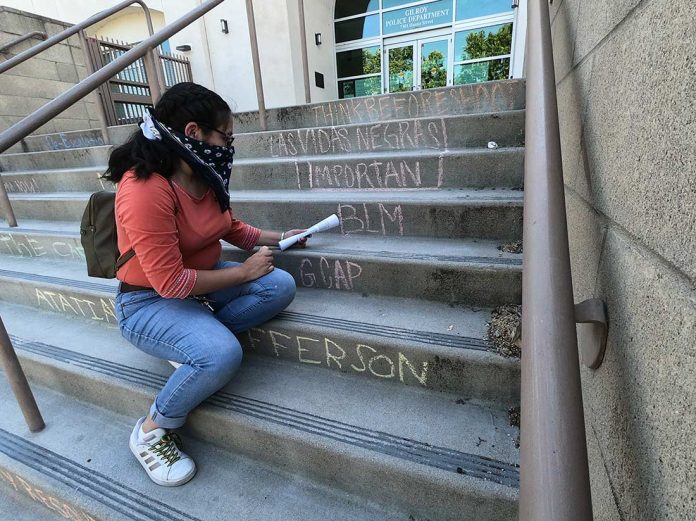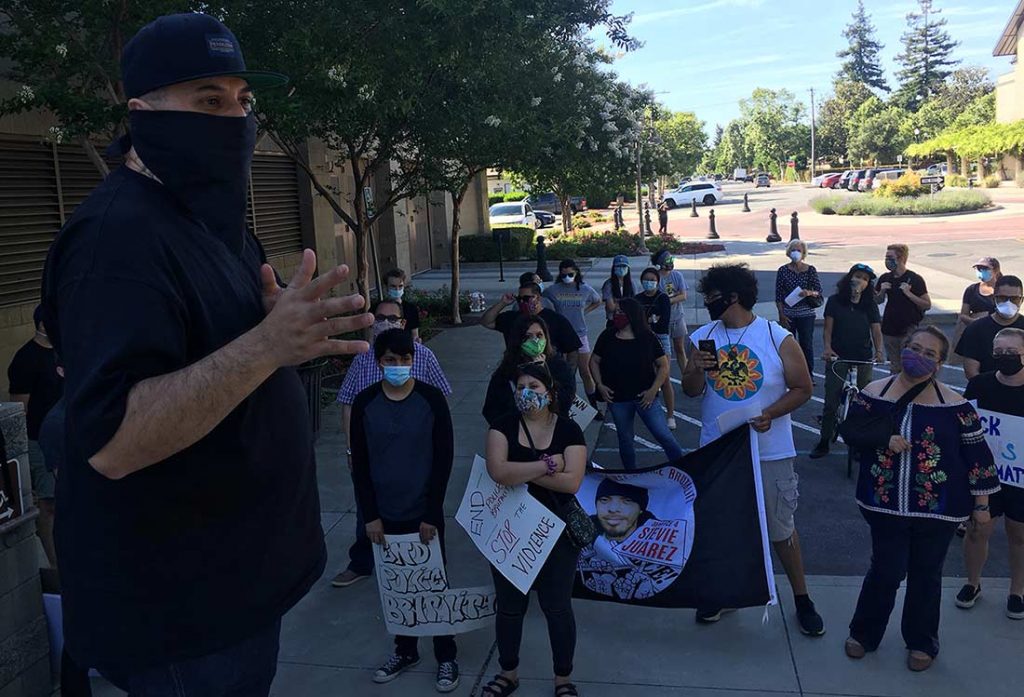
About 40 people attended a demonstration in support of public safety reform and accountability in front of the Gilroy Police Department Thursday evening.
The June 18 rally and press conference was organized by a group of local residents known as Gilroy Community Action on Policing. Attendees brought signs supporting Black Lives Matter and denouncing recent incidents of police violence in other communities, particularly the deaths of George Floyd and Breonna Taylor.
“We are here today to start a conversation about what we want public safety to look like in our community, while we push for specific reforms to the current system of policing,” said Eric Heiser, one of the Gilroy CAP organizers. “These reforms will bring more transparency and accountability that will help to combat the power dynamics and biases—implicit and explicit—that are responsible for mistrust and fear of the police for many in our community and, more specifically, countless instances of deep and intense pain for…communities like ours around the country.”
Also speaking at the event were activists who work with vulnerable communities and families that have suffered casualties involving police officers. Rebeca Armendariz, a Gilroy resident and city council candidate, spoke about the death of her cousin, Steven Juarez, in police custody just over two years ago.
Armendariz accused the police department of trying to serve as “judge, jury and executioner.” She suggested that in-custody deaths and police violence investigations deserve more independent scrutiny, beyond the oversight offered by top brass and the district attorney’s office.
“We hope that nobody else will die at the hands of police,” said Armendariz.
Juarez died the night of Feb. 25, 2018, after a foot chase with multiple officers on Chestnut Street. Officers used a Taser and physical force to try to apprehend him, and applied a carotid artery restraint before he lost consciousness. He was pronounced dead shortly after he lost consciousness, according to authorities.
Earlier this week, Gilroy Police Chief Scot Smithee said the department has suspended the use of the carotid hold due to recent guidance from Gov. Gavin Newsom and Attorney General Xavier Becerra.
Prior to the June 18 demonstration, Gilroy CAP had also asked the police department to schedule an online town hall about public safety in Gilroy.
The Gilroy Police Department has scheduled such an event for 5:30-6:30pm June 25 on Facebook Live.
Also speaking at the June 18 event was Jose Valle of Silicon Valley De-Bug. He urged the crowd and the community to put differences aside to work against alleged racial injustice.
“It’s time to come together,” Valle said. “This system is not for us.”

Prior to the demonstration, the Gilroy CAP activists used chalk to decorate the front steps and driveway of the police department with the names of recent victims of police violence, including Juarez, Floyd and Taylor. They wrote slogans such as “STOP THE VIOLENCE” and “MORE MENTAL HEALTH RESOURCES, NOT PRISONS.”
A group of Gilroy CAP organizers read a list of 19 reforms they have proposed for the Gilroy Police Department, many of which have become part of the nationwide refrain of public safety reform activists. From a press release Gilroy CAP sent to the Dispatch earlier this week, their proposals are:
• Ban the use of the carotid control hold and all other neck restraints.
• Outright ban on shooting at moving vehicles.
• Further elaborate GPD’s peaceful demonstrations policy. Ban the use of rubber bullets and chemical weapons such as tear gas.
• Create an online and/or email submission option for complaints against officers
• Release all data on use of force reports and citizen complaints in an easily accessible format for the general public.
• Maintain and release permanent disciplinary records for all police officers.
• Public identification of officers involved in civilian complaints of racism, excessive use of force, and sexual harassment and assault.
• Establish a Civilian Review Board to provide community oversight on civilian complaints against the police department. In the meantime, increase transparency on and add an appeals process to investigations of civilian complaints against officers.
• Required body cams for all on duty officers, and disciplinary action in response to officers whose body cams are off.
• Establish a duty to intervene into a partner officer’s excessive use of force, and disciplinary action in response to a failure to intervene.
• Police training on de-escalation, racial bias, and mental illness must be done more frequently than five years.
• Require de-escalation.
• Require warning before shooting/use of force. A warning should not exempt police officers from receiving disciplinary action when wrongful actions were taken
• Reduce the use of armed officers in criminal investigations after the fact.
• Disallow the purchase of surplus military equipment by the police department.
• Protect and expand current investment in community-led health and safety strategies, instead of investing in the police.
• Eliminate police presence on school campuses, and disinvolve the police department in disciplinary matters.
• Hiring and dispatching an unarmed crisis management team in response to mental
health-related, substance abuse, suicide prevention and intervention, nonhoused-related, conflict resolution and similar situations
• Any additional increases to GPD funding should not exceed the rate of inflation and be proportional to the growth of Gilroy’s population. These increases in funding should primarily be allocated to crisis response teams.












